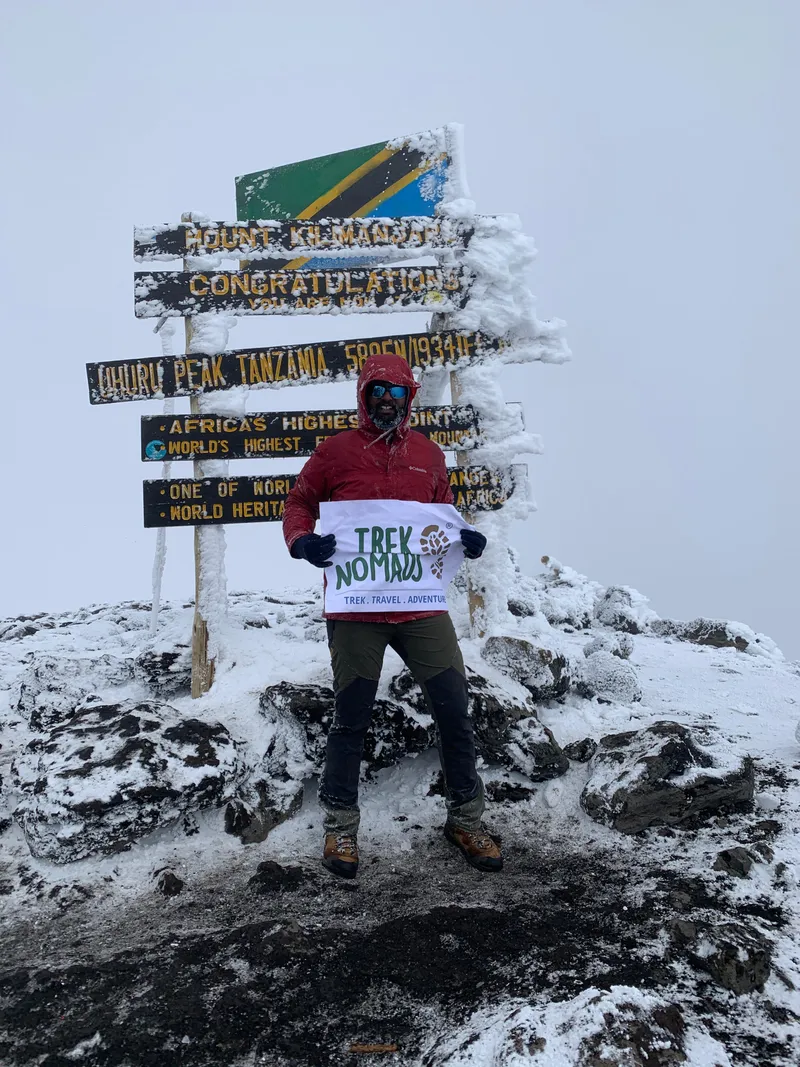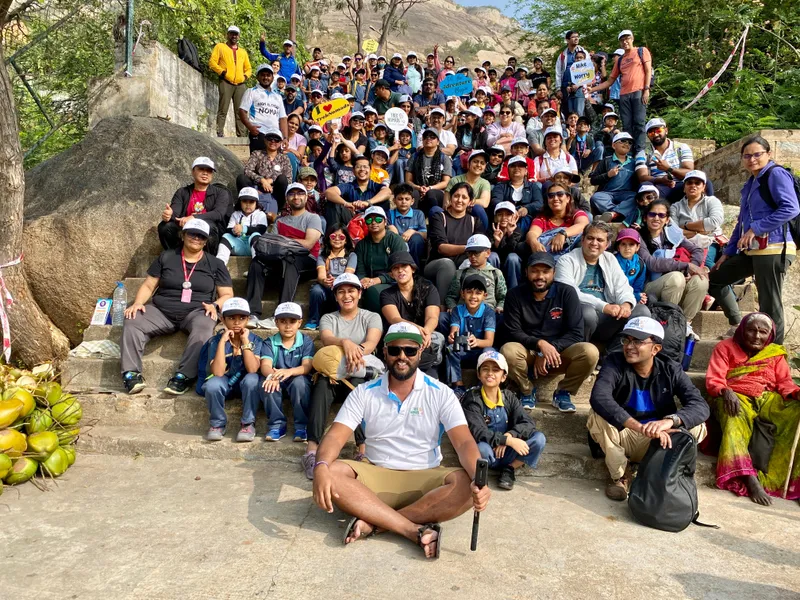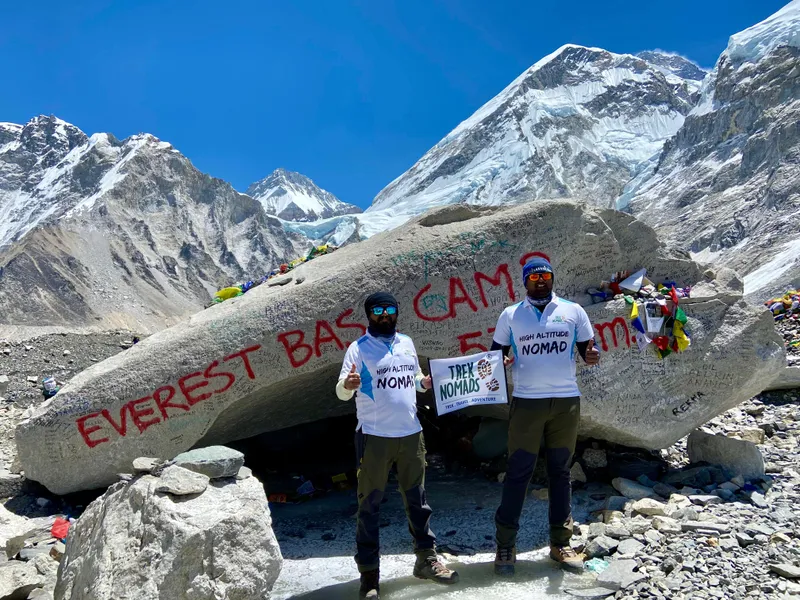Bengaluru-based TrekNomads goes the extra mile to make trekking inclusive
Founded by Naveen Mallesh and Mahendra Rathod, TrekNomads is building a community where trekkers across age groups can connect with nature without any limitations.
“To walk in nature is to witness a thousand miracles…”
These words by social entrepreneur and CEO of Special Olympics Mary Davis echo the sentiment of explorers and adventure enthusiasts who regularly trek in the mountains to become one with nature.
This was also what sparked Bengaluru-based Naveen Mallesh’s sense of adventure at an early age. As a seven-year-old, he would climb hillocks around his home that were easily accessible, much before commercialisation took over the city.
His involvement in the National Cadet Corps (NCC) furthered his interest in trekking. In high school, Mallesh and a group of students trekked to the Shivagange mountain near Tumkur, besides other destinations in the Western Ghats.
The thirst for new experiences stayed with him long after childhood, pushing him to start a community of trekkers on Facebook with another trekking enthusiast, Mahendra Rathod.
Thus, TrekNomads was born.
The idea behind creating TrekNomads was to make trekking accessible to everyone, irrespective of age, gender or background. The community organises end-to-end trekking experiences known as trekcations in India and overseas, for their clientele to experience nature without compromising on comfort or quality.
“We wanted to build a community to enable people to be in the mountains by ensuring they are comfortable from the word go. Trekcations are what we offer, where trekking is the core element but it is still a vacation,” says Mallesh.
Laying the foundation
After Mallesh’s hyperlocal hobby marketplace BookMyInterest was acquired by Xoxoday in 2016, he took on the role of business development there. This is where he met Rathod, who further ignited his passion for trekking.
What made him pursue the TrekNomads dream was the gap that existed in the market around trekking.
“Trekking is still considered ideal for young people. Mahendra and I discussed how we could make it comfortable for everyone, including homemakers and working professionals who wanted to venture into nature but were hesitant about doing it because of age or fitness restrictions,” reveals Mallesh.

In 2019, Mallesh also got certified as a mountaineer from the Jawahar Institute of Mountaineering and Winter Sports.
Shortly after, TrekNomads came to life. In 2019, after testing the waters for a while, the duo registered it as a company.
Trekking for all
Currently, TrekNomads offers a range of treks based on what their customers prefer. It operates in Uttarakhand, Karnataka, Kashmir, Ladakh, West Bengal and Sikkim, as well as certain international destinations.
They offer easy to moderate day-long treks over the weekend, including two-day treks to Kurinjal peak in the Kudremukh National Park, Ettina Bhuja (close to the town of Dharmasthala), Brahmagiri in the ghats of south Karnataka, and the relatively lesser known peak of Nishani Motte in Coorg, among others.
TrekNomads also organises group or corporate outings alongside solo expeditions accompanied by a guide or even a translator for expats.
There are also some Himalayan treks that are popular, including the Sham Valley trek in Ladakh that takes one through scenic villages, ancient monasteries and lush green valleys. Other options include Lasermo La trek, an eight to nine-day expedition that takes visitors through the serenity of Nubra Valley.
“We have also ventured into international treks, with Nepal being our primary destination. Some of our extensive treks happen in the Everest and Annapurna regions. Other options include Malaysia and Vietnam,” says Mallesh.

They also have expeditions in India, Nepal, Tanzania and Russia, where they scale high peaks. However, some technical knowledge about mountaineering is a must for these treks.
Inclusivity is a guiding ethos for TrekNomads, which is why they don't shy away from planning customised treks. Mallesh recalls organising a day-long trek for autistic children where they also engaged in ziplining, rappelling and kayaking.
“We have also done some other treks for families that have people across age groups. In this situation, we increase the number of acclimatisation days so that it's comfortable for everyone when they get to a higher altitude,” he reiterates.
Easing challenges
There are several logistical challenges that need to be taken care of to ensure treks happen smoothly.
“When people are trekking, what does one do about the extra luggage? We have to align porters, plus local guides and a professional trek leader. Our trekking packages are inclusive of insurance, not just related to travel or medical issues, but also for adventure,” Mallesh adds.
Safety is also an important consideration while organising treks. Mallesh shares that they do not operate on trek routes that are heavily secluded where exiting isn't easy.

If any emergency occurs on the trek route, TrekNomads has the facility of helicopter evacuation.
Before each trek, the TrekNomads team also gives an exercise chart to participants and conducts brief calls, educating them about things to carry.
“There are certain things that are not in our control. At the end of the day, you are going against gravity. But if something goes wrong, we have the exit routes ready for the nearest accessible areas,” he adds.
While the average cost for one-day treks is Rs 1,000, the Himalayan treks can go up to Rs 30,000 or more. For international treks and expeditions, the cost is anywhere between Rs 1.5 lakh to Rs 2 lakh.
Making an impact
During the COVID-19 pandemic, Mallesh and his partner also started the TrekNomads Foundation to work with people on the ground. The idea was to hire locals and support them throughout the year, even when it's not trekking season.
“Such people are dependent on tourism. While a few months are great for them, in the other months, they have no work. We take care of their healthcare and education, as well as offer assistance during distress or any natural calamity,” says Mallesh.
Having organised successful treks with over 11,000 people so far, TrekNomads is raring to go even further. It plans to extend its portfolio of expeditions for trekkers in the near future.
They are working with multiple schools in Bengaluru to spread awareness about the benefits of trekking at an early age. “We have designed programmes for students of different age groups. From Grade 1 to 4, there's a one kid one parent trek since they are young. For Grade 10-12, we do treks where we ask them to leave their digital devices behind to improve their sensory experience,” says Mallesh.
Going forward, they also want to cater to more corporates. “Interestingly, we had a company reach out to us where it's a mandate for employees to have done two treks a year in the appraisal season. We want to be able to move toward these things,” he adds.
Edited by Jyoti Narayan







